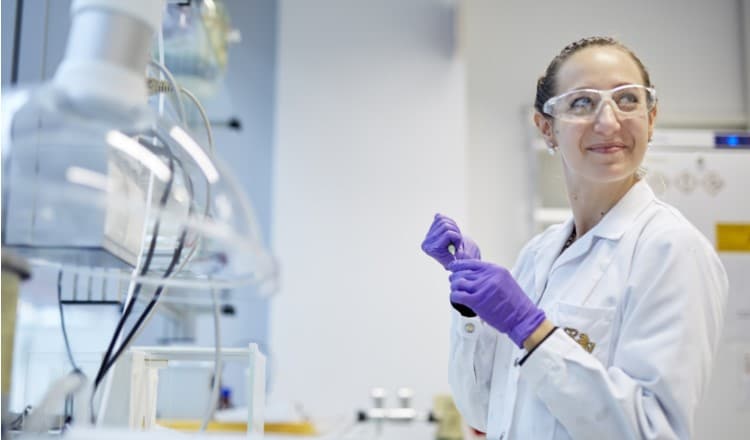Integrated Report 2019
| INTEGRATED REPORT 2019 |
Our ambition to drive the end of cigarette smoking rests on rigorous scientific assessment, highly reliable products, and strict regulatory compliance.
In this chapter you will find:

Topic description
To PMI, product reliability means securing the quality and integrity of our products, their components and ingredients, in line with appropriate design and manufacturing standards. Specifically, for our smoke-free products, it means ensuring that these products reduce risks relative to smoking cigarettes and that the main scientifically substantiated attributes of smoke-free products are upheld.
Why it is important to us and our stakeholders
Cigarette smoking causes serious diseases and is addictive. The best thing is to never start or to quit. While it is the burning of tobacco that creates the vast majority of harmful chemicals, it is the duty of global manufacturers to ensure that – for adult smokers who would otherwise continue to smoke – the product formulation and design does not increase the risk to health inherent in cigarette smoking. For adult smokers who switch to products that do not combust tobacco, it is of paramount importance that these alternatives be both scientifically substantiated to demonstrate they present less risk to health than continued smoking and be developed, tested, and manufactured in accordance with the applicable regulations and PMI internal standards to ensure product integrity and quality. Only in this way can smoke-free products positively contribute to consumers’ health.
PMI has made it its mission to replace cigarettes with smoke-free products as soon as possible. While smoke-free products are not risk-free, they offer less harmful alternatives to those adult smokers who will not quit nicotine use. Our ambition of a smoke-free future relies on the development and commercialization of products that meet both stringent scientific requirements and technical design criteria. Smoke-free products must work as intended, and this is ensured through extensive and stringent assessment and controls so that our consumers and stakeholders can have complete confidence in the quality of our products. Investments to maintain and continuously improve the reliability of our products enable us to protect our reputation and brand value while complying with regulations.
Achieving our aims
At PMI, our ambition is to deliver highly reliable products based on carefully controlled design verification protocols and rigorous manufacturing standards. Our commitment to quality aligns with international standards such as ISO, and for smoke-free products is inspired in part by good manufacturing practices (GMP – commonly applied in other industries like food or pharmaceuticals). Our quality management system covers all of our manufactured products: smoke-free as well as combustible.
Our approach to product reliability starts with our farmers and suppliers. We work with them to secure high-quality raw materials, applying robust procurement processes, auditing, and quality procedures. All ingredients and materials we source must comply with applicable regulations, our internal standards, our Responsible Sourcing Principles, and Good Agricultural Practices.
Our factories are all designed to ensure we manufacture our products to the highest quality standards. This includes, for example, the careful selection of materials in contact with the semi-finished and finished products during manufacturing and the delivery of appropriate training to operators. Our manufacturing and PMI’s rigorous quality management system are subject to inspections by authorities and certified bodies. Globally, a team of 1,500 quality assurance professionals ensures that the quality control covers incoming materials, semi-finished components, and finished products. With respect to key electronic suppliers, we have an additional management measure whereby a PMI quality assurance colleague works with each supplier on-site. Toxicological assessment of the heated tobacco products (consumable and electronic devices), as well as cigarettes, is conducted by experienced toxicologists. Compliance with our quality and data standards is monitored using audits by PMI’s Global Quality Services.
Product reliability extends also to packaging and transport of finished goods to ensure they reach the consumer in proper condition. Packaging has a key role to play in this regard. It also helps ensure the traceability of our products so we can act promptly should issues arise. Further, each device is batch-coded so we can trace any defect to the exact manufacturing location, and, in the event of a product recall (of which there were none in 2019), we can assess the root cause of the problem and conduct the recall in an efficient and targeted manner.
Governance and accountability for product integrity and reliability at PMI sits at the highest management level and is guided by a Quality Management System and Internal Standards defined by experienced professionals from different functions. Our work on product integrity and reliability is mainly carried out by teams in our product development, procurement, manufacturing operations, and quality organization departments. Their collective efforts ensure we preserve quality from raw material to retail shelf.
Smoke-free products
Smoke-free products under our IQOS brand portfolio include heated tobacco products and e-vapor products. Our IQOS heat-not-burn product works as a sophisticated system comprising the electronic holder and its charger (integral to the device in some products) and the consumables.
Smoke-free systems comprising the consumable and electronic device are subject to strict design control, which ensures that the product is developed according to predefined and controlled criteria demonstrating its reduced toxicity when compared with cigarette smoking. When changes are made to the product, this is done under a strict change control process that ensures that the change does not impact Quality, Safety, Performance, and Regulatory Compliance.
In addition, as part of product development, we apply use-hazard analysis. We assess what a consumer could do wrong and how the product might be misused or abused.
Heat-not-burn product devices
The electronic devices for our heat-not-burn product are manufactured according to internal standards and ISO 9001 principles and certified according to the applicable regulations and standards. The suppliers of our electronic parts and components of the device, including batteries, must also operate under these quality standards. Particular attention is given to the selection of batteries where PMI carefully selects the supplier and performs detailed testing before qualification. Each finished device is subject to rigorous controls before shipment.
In case of consumer complaints regarding the devices, PMI has established a thorough inspection process enabling root cause analysis that is then used to improve our products and components.
Since the reliability of devices and their lifetime contribute to sustainability outcomes, we strive to strike the right balance between a product’s lifetime in use (and thus lower demand on natural resources) and the process of updating and improving the product’s effectiveness and competitiveness in the market.
Heated tobacco units
IQOS heated tobacco units are inserted by the consumer into the device holder. The heated tobacco units are composed of a tobacco plug, hollow acetate tube, polymer-film filter, cellulose acetate mouthpiece filter, and filter papers. The uniquely processed tobacco plug is made from a reconstituted blend of high-quality tobacco leaves. We disclose the ingredients of our heated tobacco units on our website.
The manufacturing of heated tobacco units involves high levels of precision and consistency. For instance, the diameter of the unit, as well as the properties of the cast leaf, are crucial to product performance.
Heated tobacco units are also tested for stability, using standard protocols covering different temperature and humidity ranges, and the design and packaging aim to preserve the product quality and safety despite various conditions to which the consumer may subject them (read more on www.pmiscience.com). This is important as our products will be used in different regions of the world; therefore, we need data to demonstrate that the product’s performance will be maintained in various climatic conditions.
E-vapor products
Our e-vapor devices include a cartridge, or tank, containing an e-liquid. The reliability of the product depends on the integrity of the tank; if tampered with, the product could fail. We recognize a trade-off between product reliability and recyclability, but safety of use is our top priority: We are committed to closed tank systems in the development and commercialization of e-cigarettes.
We also test our packaging to ensure compliance with the EU Tobacco Products Directive, and we engage with external agencies who test the integrity and safety of e-liquid packaging.
Combustible products
Our combustible products are also subject to strict product development controls. The product specifications for cigarettes are strictly adhered to, and at PMI we also apply further internal requirements to ensure the highest quality of our products. We disclose on our website the ingredients used in our conventional products.
Besides tobacco ingredients, non-tobacco material such as cigarette paper, filters, and packaging materials are used in our products. Selected ingredients and materials undergo a toxicological assessment to ensure that their use does not increase the inherent toxicity of cigarette smoke. Packaging materials are tested to ensure the absence of migration of undesired chemicals into the cigarettes. Further, a regulatory compliance assessment is performed to ensure compliance with applicable regulations.
This online supplement to our integrated report should be read in conjunction with PMI’s Integrated Report 2019. The information and data presented in this online supplement cover the 2019 calendar year or reflect status at December 31, 2019, worldwide, unless otherwise indicated. Where not specified, data come from PMI estimates. See About this online supplement for more information. Aspirational targets and goals do not constitute financial projections, and achievement of future results is subject to risks, uncertainties and inaccurate assumptions, as outlined in our forward-looking and cautionary statements.




